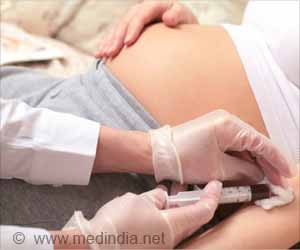Giving antibiotics before miscarriage surgery did not result in a significant reduction in pelvic infection, reveals a new study.

‘Giving antibiotics before miscarriage surgery did not result in a significant reduction in pelvic infection.’
Read More..




The trial involved thousands of women at hospitals across four low and middle-income countries and investigated whether giving a preventative single dose of inexpensive and widely available antibiotics to women prior to surgery reduces the risk of pelvic infection.Read More..
Sometimes not all of the pregnancy tissue contents of the womb come away on their own after a miscarriage. When this occurs, surgery may be required to remove it. Miscarriage surgery is one of the most common surgical procedures carried out around the world.
The results of the trial showed that giving antibiotics prior to miscarriage surgery did not result in a significant reduction in pelvic infection within 14 days post-surgery if clinical judgment was used to determine if there was an infection or not, however, when the strict international definition of pelvic infection was used then antibiotics were beneficial.
Before this study, there was little information to guide practice, despite it being such a common procedure. Now practitioners and policy makers have high-quality evidence.
It is particularly important to ensure that antibiotic prescribing is guided by the highest quality evidence to ensure we minimize unnecessary antibiotic use, which can fuel antibiotic resistance. International guidelines and practice should now be reassessed in light of this evidence.
Advertisement
Just over 3,400 women were recruited to the randomized trial between June 2014 and April 2017 from 13 hospitals across Malawi, Tanzania, Uganda, and Pakistan. All women who took part were scheduled for surgery after suffering a miscarriage when they were less than 22 weeks pregnant.
Advertisement
Lead author Dr. David Lissauer, of the University of Birmingham, said: "The question of whether to use antibiotics is particularly important in low and middle-income countries.
"Rates of surgery for miscarriage are high owing to low uptake of non-surgical management approaches, infections are more common following surgery in these countries versus higher resource countries, and access to resources to care for women who do develop complications is poor.
"Before the AIMS trial, we had no idea what the right thing was to reduce the serious complication of pelvic infection.
"We finally now have the highest quality evidence that a single, cheap, preventative dose of two commonly available antibiotics was not only safe but also appeared to reduce pelvic infection if the infection was diagnosed using strict international criteria."
Arri Coomarasamy, Professor of Gynaecology at the University of Birmingham and Director of Tommy's National Centre for Miscarriage Research, added: "Prior to our study there has been little evidence to guide clinical practice, with previous trials evaluating antibiotic treatment pre-surgery in patients undergoing miscarriage surgery being limited by their size and quality.
"Through carrying out a study on such a large scale across multiple hospitals and countries, we now have valuable evidence.
"We hope that this evidence will now be used to shape international guidelines and policy practice and will lead to improved treatment for women, potentially saving lives."
Source-Eurekalert















